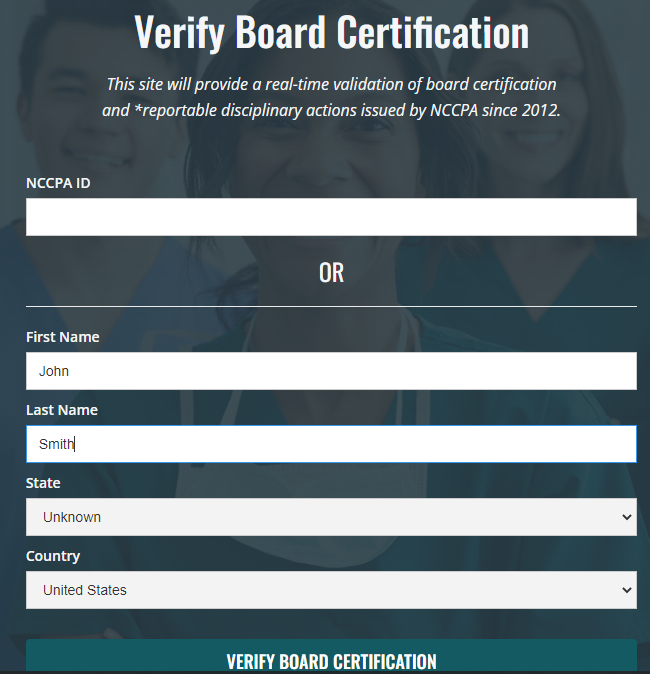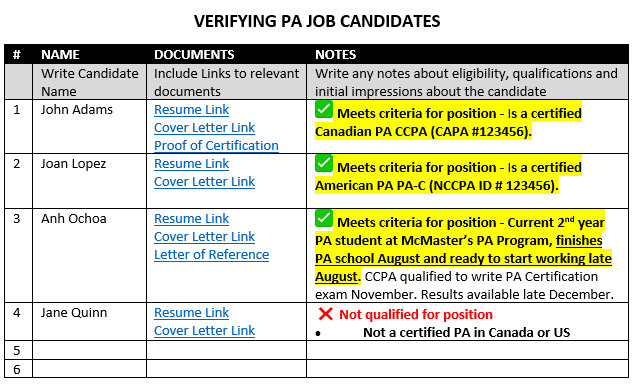Verifying if a PA is certified to work in Canada
When recruiting a PA to add to your practice, your priority is to recruit certified professional who meet the necessary standards and possess essential skills to delivery high quality care to your patients.
In Canada, PAs who are Canadian and American-certified (CCPA and PA-C respectively), can work in Canada.
In this post:
Why ensuring your PA candidates are certified is important
Requirements to work as a PA by province
How to Verify a Canadian Certified PA (CCPA)
How to Verify an American Certified PA (PA-C)
Frequently Asked Questions
I. Why ensuring your PA candidates are certified is important
A certified PA that can work in Canada will have a CCPA designation (Canadian Certified) or PA-C designation (American-certified).
Hiring certified PAs offers numerous benefits to your practice:
Demonstrated Competence and Knowledge: Certified PAs have successfully completed accredited PA programs, which typically consist of classroom/group-learning instruction, medical foundations, clinical skills, clinical placements and and extensive clinical rotations. They have acquired in-depth knowledge and skills across various medical disciplines, enabling them to provide comprehensive care to patients. Competencies are outlined by the EPA-PA Competency Framework developed by CAPA.
Adherence to Professional Standards and Ethics: Certified PAs are held to high professional standards and ethical guidelines established by regulatory bodies and professional associations. In Canada this is CanMEDS-PA. They are committed to upholding patient confidentiality, practicing with integrity, and maintaining professionalism in their interactions with patients, colleagues, and other healthcare professionals.
Commitment to Continuing Education and Professional Development: Certified PAs understand the importance of staying current with advances in medicine and healthcare practices. They are dedicated to lifelong learning and engage in continuing education activities to enhance their knowledge, skills, and abilities. This commitment ensures that they provide up-to-date and evidence-based care to their patients. CCPAs maintain their PA certification by completing continuing professional development (CPD) credits, tracked using the Royal College of Physicians and Surgeons of Canada Mainport ePortfolio, as overseen by the PA Certification Council of Canada (PACCC).
Access to malpractice insurance. Certified Physician Assistants in Canada (CCPAs) have access to liability and malpractice insurance through Smith & Reid covering up to $10 million. You can request proof of liability insurance coverage upon hiring a PA.
II. Requirements to work as a PA by Province
1) PA Educational Requirements
When reviewing PA candidate resumes/CVs, identify WHERE a PA has completed their PA Education.
Candidates qualified to work in Canada must either:
Graduate from a recognized Canadian PA program (University of Toronto, McMaster, University of Manitoba or Canadian Armed Forces as per CAPA)
or an equivalent PA program (in this case, it would be an accredited American PA program as per ARC-PA)
2) Certification Requirements
Must be CCPA: Following completion of an accredited PA program in Canada, PAs must pass the Physician Assistant Entry-to-Practice Certification Examination (PA Entry Exam) as administered by the Physician Assistant Certification Council of Canada (PACCC). Resumes will identify a CAPA ID #, which you can verify on CAPA’s “List of CCPAs” page.
Or Must be PA-C: After American PAs complete their education at an accredited PA program, they need to pass the Physician Assistant National Certifying Examination (PANCE) administered by the NCCPA in the United States.
* Or may be CCPA-eligible: New PA graduates who finish in August of the year, and are eligible to write the exam in November may be hired, on the contingency that they provide proof of passing the PA Entry to Practice Exam (results are usually available in December or January of the next year).
3) Member in Good Standing with CAPA
In order to maintain PA certification and CCPA designation status, PAs track their Continuing Professional Development (CPD) hours through the Canadian Association of Physician Assistants (CAPA). Requirements are as follows:
All CCPAs and those tracking their MOC requirements must annually renew their CAPA Membership and earn and report at least:
400 credit hours over the course of your five-year cycle by participating in educational activities that meet the identified needs of PA professional practice.
A minimum of 40 credit hours of CPD activities per year, even in the years after the PA has reached the 400-credit minimum requirement.
PAs track their CPD hours through CAPA via the Royal College of Physicians and Surgeons of Canada.
This can only be done if certified PAs are members in good standing with their CCPA-designation is to be a regular member in good standing with CAPA.
How can I verify if a PA is in good standing with CAPA? PAs can provide proof of membership by providing their CAPA ID #, which you can confirm if they are in good standing through CAPA’s list of CCPAs.
The PA candidate would need to contact CAPA (admin@capa-acam.ca) to request that a letter be sent to you (the employer or potential employer) verifying that the PA is maintaining your CCPA designation and CPD credits.
III. How to Verify a PA’s Certification in Canada (CCPA Designation)
To verify if a PA is certified in Canada, you can access the CCPA registry. The registry contains a comprehensive list of PAs who hold the CCPA certification.
By searching for the PA's name or registration number in the registry, you can confirm their certification status.
Here is an example using my name:
Verifying if a PA is CCPA
On CAPA’s List of CCPAs website, you can search by Last Name, First Name, or CAPA number.
IV. How to Verify a PA’s Certification in United States (PA-C designation)
When considering PA candidates certified in the United States, it is equally important to verify their certification through the Physician Assistant-Certified (PA-C) credential. The PA-C certification is awarded by the National Certification Council of Physician Assistants (NCCPA) in the United States.
Verifying if a PA is PA-Certified in the US
On the “Verify PA-C” website for NCCPA, you can search by NCCPA ID, First Name or Last Name to verify if a PA is certified through an accredited American PA program.
V. Screening PA candidates
Here is example of a quick document you can put together in a word processor or spread sheet.
This includes:
List of candidates by Name
Links to documents (e.g. upload submitted resumes, cover letters, other files to Google Drive, Dropbox, etc. and include the link)
Notes on candidates
In the example above, I have used the “Notes section” to highlight who is qualified and unqualified for the PA job posting based on the criteria outlined by the job posting.
You can download this template/worksheet below:
VI. Frequently Asked Questions about Verifying PA Certification Status
Q. Can a PA certified in the United States work in Canada?
Answer: Yes, PAs certified in the United States (PA-C) can work in Canada; however, they must meet the specific requirements set by each province's regulatory body. Employers should still verify PA certification for American trained and certified Physician Assistants.
The PA would need to go through the certification and registration processes outlined by the respective provincial regulatory authorities to practice as a PA in Canada. See section II. Requirements to work as a PA by province (above).
Q. I want to hire a Canadian trained PA who just graduated, but who has not yet return the PA certification exam. Can I still hire them?
Answer: New PA graduates who finish in August of the year, and are eligible to write the exam in November may be hired, on the contingency that they provide proof of passing the PA Entry to Practice Exam (results are usually available in December or January of the next year).
Q. How can I tell if a new PA Graduate is eligible to write the CCPA?
Answer: Here a few steps you can take to ensure the PA you are hiring will be board-certified:
Ensure the PA is a graduate from a Canadian accredited PA program or accredited American PA program. Verify the school on the resume matches one of the accredited PA program. You can also email the PA program listed on the candidate’s resume to verify if they have graduated.
Ensure your PA job posting and PA employment contract outlines that new PA graduates who are qualified to write the PACCC PA Entry to Practice Exam or PANCE by the time they graduate. Ongoing employment is contingent on passing the exam and maintaining certification. Exams are written in November of each year, with results of pass/fail being available in December that year, or early January.
Once passed, the PA employee should forward proof of passing the PA certification exam. PAs who pass will also appear on the Registry of Canadian Certified PAs / PA-Cs and will be searchable by last name.
Q. I have had multiple candidates apply who have not completed a PA program, but have health care/medical experience internationally, or have passed MCCQE/MCCEE, USMLE step 1, 2, 3. Are they considered qualified Physician Assistants?
Answer: These candidates are not considered Canadian-trained or certified Physician Assistants (PA). Be sure to look for verification that the candidate has attended an accredited Canadian or American PA program, and is eligible to write the exam or is CCPA/PA-C certified (see above).
Final notes
Prioritizing certified PAs adds credibility and expertise to your practice, ultimately enhancing patient care and safety. Stay informed about the certification requirements in your province and utilize the resources provided by the Canadian Association of Physician Assistants (CAPA) and the National Certification Council of Physician Assistants (NCCPA) to ensure the authenticity of a PA's credentials.
By making informed hiring decisions, you can build a strong healthcare team that delivers exceptional care to patients.



